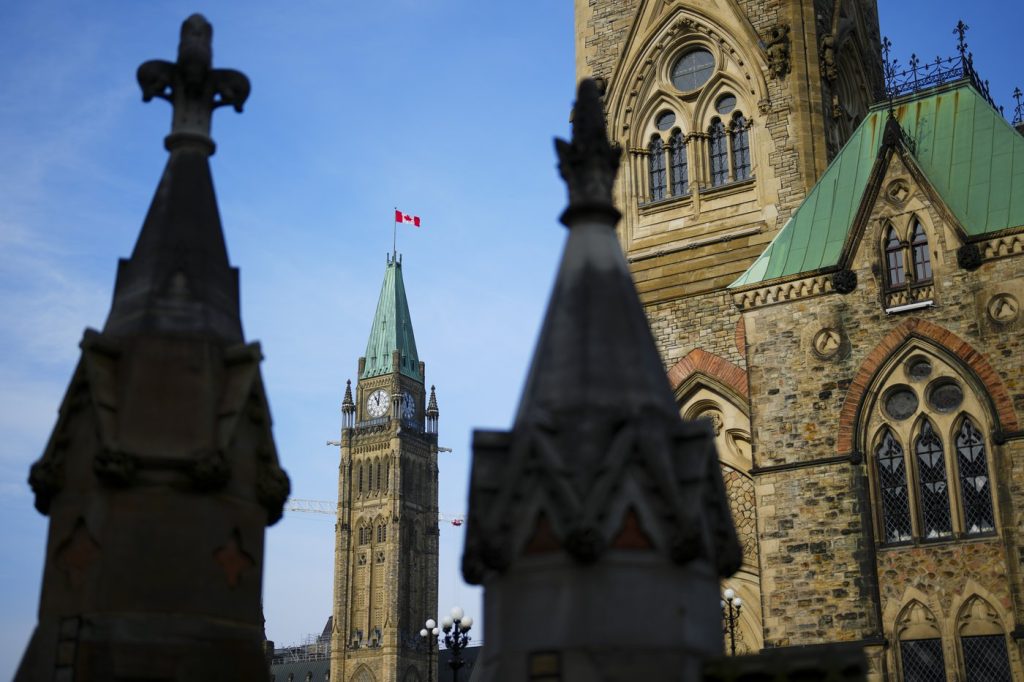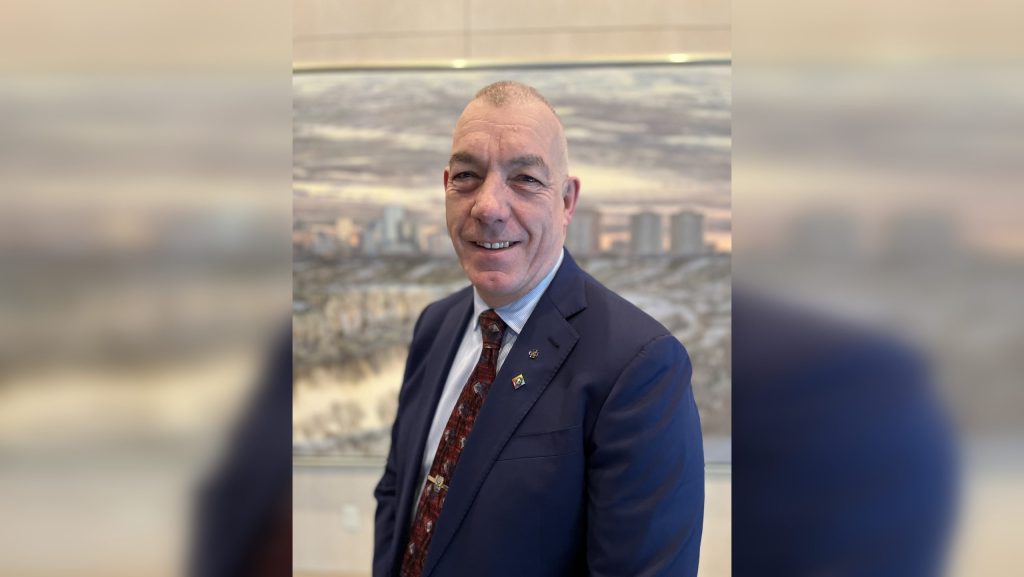‘Living my truth as an Indigenous storyteller’: Journalist Nicole McCormick shares her story
Posted June 26, 2020 11:22 am.
June is National Indigenous History Month. It is a time for all Canadians — Indigenous, non-Indigenous and newcomers — to reflect upon and learn the history, sacrifices, cultures, contributions, and strength of First Nations, Inuit and Metis people. Throughout the month of June, we will profile Indigenous people, and share their stories and voices, so that we can celebrate the difference they have made in their communities and to our country.
June 26: Today, journalist Nicole McCormick shares her story in her own words
Shé:kon Sewakwé:kon. Nicole yónkyats. A’nó:wara niwaki⁷tarò:ten. Kanyen’kehá:ka niwakonhwentsyò:ten. Ohswé:ken nithoné:non ne akhwá:tsire.
Greetings everyone. My name is Nicole. I am Turtle Clan. I am Mohawk. My family is from Six Nations of the Grand River Territory. Six Nations is the largest reserve in Canada and home to more than 26,000 people from six different nations: Mohawk, Oneida, Seneca, Cayuga, Tuscarora and Onondaga.
That is who I am. Now, what I do.
I have been a journalist for over twenty years. I have worked in both Canadian and U.S. television markets over the course of my career. I am now the managing assignment editor at CityNews Toronto. I have been a member of this team for the last the 13 years. I am also the spokesperson for the Rogers Indigenous Peoples Network. I have assisted the Rogers Hometown Hockey team with the first-ever broadcast from an Indigenous community in Enoch Cree Nation, Alberta, last year. I hosted an online pre-show where we discussion about Indigenous sport. That broadcast was nominated for a Canadian Screen Award. This year, I helped the team once again with another successful broadcast at Peguis First Nation in Manitoba.
The strength of who we are as Indigenous people comes from that fact we speak from the heart. For thousands of years, we’ve passed on traditional knowledge, history and culture. It was natural for me to built a career on listening and telling other’s stories. In that spirit, I’d like to share a personal story with you.
Like many Indigenous children, I wasn’t given the best start in life. I was born to a mother who suffered from addiction. My biological father left before I was born. I was in a foster home until I was five, when my mother was able to care for me again. Shortly before my sixth birthday, my mother introduced me to a man named Peter. That meeting changed the direction of my entire life. I got to know him. I met his family. Two years later, on Aug. 22, 1988, Peter did the most selfless thing a man could do. He chose to officially make me his daughter and raise me as his own. He chose me. I had a family. Two parents who loved me and two awesome little brothers. Unfortunately, a few years later, my mother relapsed. My father rescued us from a bad situation. He began to raise three of us as a single father. Growing up, my father always told me I was Indigenous and that I was capable of achieving great things. Sometimes that was hard to believe when I was struggling to figure life out and trying to find your place in the world. I remember feeling like a piece of my puzzle was missing. I always knew I was First Nations, but I didn’t know what that truly meant. It was my father and stepmother who helped me claim my Indigenous identity. As a young adult starting journalism school, I began to educate myself on Indigenous issues.
I started my career during a time of turmoil just outside my reserve in Caledonia. It was also a time where imagery spoke of missing women, intoxicated people, homeless people who shared my identity, What I what I saw in my house was a hardworking father, stepmother and three kids in the school system. A complete contradiction. There was even a time I questioned my own worth as a person during the that time of learning. It was during a conversation with a college professor, where he said, “You are more than what is seen on TV Nicole. You have a responsibility as an Indigenous person to change that perception.” He encouraged me to apply for a Indigenous internship award and I felt that I needed to immerse myself in my culture. It was those actions that confirmed for me that becoming a journalist, a storyteller, was my calling. I began to learn about my biological family history and where I came from, which meant spending time at Six Nations.
I learned about my culture. I went to pow wows. I learned how to make dreamcatchers and bead. Both were medicine for me, as in my early twenties I was diagnosed with PTSD (post-traumatic stress disorder) from experiences living with an addict and coping with abandonment by both of biological parents. I went to drum circles. I spoke with Elders, knowledge keepers and my community. I was learning about what it means to be Indigenous. The reality is I lived the stereotype. Based on statistics, I am not supposed to the success I have become.
Why is it important for you all to hear my story? Because my story mirrors that many other Indigenous children. The difference being many of them weren’t lucky enough to have someone enter their life and change its course like I did. I’ve spent years talking with children — as my way of giving back — telling them that no matter their beginning, they can be whatever they want in this life.
As part of my growth, it took until four years ago for me to find the inspiration to start sharing who I am at Rogers as one of the few Indigenous members of the Indigenous Peoples Network. I have been trying to make a meaningful difference by sharing the stories of our people and ultimately the story of my authentic self.
I can honestly say it hasn’t been an easy journey trying to change corporate policies and communications, while educating colleagues who have never been introduced to Indigenous history in Canada and the impacts of that history. Driving change has been and continues to be challenging for me both personally and professionally. Situations where I’ve objected to the use of outdated terms like “Indian” or other offensive language has often led me down a blocked path where people often side with legal definitions, rather than understanding how a term can be hurtful or negative. On that specific occasion where that terminology was used, I was apologized to and positive change did eventually happen because I spoke up. I’ve often had to break rules to find someone who would listen to my thoughts, opinions to ensure changes were made or at least considered. I’ve often had people speak for me, so that my honesty could be could be taken more easily. I remember a few occasions I left work crying out of frustration and anger. All this, yet I have never given up and have always remained focused on a goal — for my Indigenous colleagues to be acknowledged, to build bridges in the community and to leave my mark in a positive way. I fought through because if there is one thing I have learned is Indigenous resilience and that my voice is the most important too I have. One year ago, I did just that, I left my mark, as the proud co-creator of the Downie-Wenjack Legacy Space, located at the Rogers headquarters in Toronto. Legacy Spaces are safe, welcoming places dedicated to providing education and spreading awareness about Indigenous history and our journey of reconciliation. This is one of my greatest contributions to date.
This Legacy Space is my purpose. It’s my why. My mark. It is my affirmation I was put on earth to change the way people view Indigenous people in a very real way. I know every story behind every person and every piece of art work in that space. The space reflects the strength of residential school survivors, the bravery of veterans, the creativity of our youth, the knowledge of our Elders. This space reflects the stories, the soul and some of the trials of a misguided history. The goal of the Legacy Space is to bring Indigenous and non-Indigenous people together to talk about the past, present and future.
Since the opening of the Rogers Downie-Wenjack Legacy Space, I have been given a platform on multiple occasions to use my voice to raise awareness and to push for change and to see those changes through. The Indigenous Peoples Network aren’t just my colleagues, but friends. True allies, who unconditionally support me, who raise me up when I am tired of fighting and who encourage me to keep my head held high. They stand beside me with open minds and open hearts. Ron MacLean, Tara Slone and the Hometown Hockey team trusted my voice, opinion and perspective as they planned both the Enoch Cree Nation and Peguis First Nation broadcasts.
As a journalist at CityNews, I have found it difficult to explain Indigenous stories and why are they are relevant. I find myself explaining things to people they may never have learned about like residential schools, the Sixties Scoop, the impacts of intergenerational trauma, the suicide crisis, discrimination in important services like healthcare, poverty and why some reserves still have no clean drinking water. I take the time to explain because I know they genuinely want to learn and be informed. They want to know the history on events they are seeing in the media. They genuinely want to see more Indigenous stories in mainstream media. I feel it is my responsibility to help educate my fellow journalists, so they can be champions for our stories.
Every day, I make it a point to learn something new about my history and my culture. Recently, I learned how to say my Indigenous introduction in my Mohawk language. I believe our language ties us to our land. When I honour who I am and where I come from, I am acknowledging my truth. When I introduce myself like this, I am not just telling you who I am but I am connecting myself to thousands of years of tradition. I can’t say it perfectly, but that will come in time. I listen to my Indigenous brothers and sisters. I listen to their thoughts, feelings and opinions. I read their stories. I read their books. I never want to stop learning because everything I learn, I can teach to others and that brings me closer to living my truth as an Indigenous storyteller.
I need you all to understand that we are more than what you see in the media and in your social media. We are land. We are language. We are medicine. We are dance and song. We are family. We are a beautiful people. We are human beings, so please, take the time get to know us. Educate yourselves about our history, our culture, our issues and you will understand why we fight as passionately as we do to be acknowledged in this country. Keep an open mind an and open heart. Indigenous peoples are known for their stories and storytelling. Every single person has a story. Be the champion of another person’s tale. You will quickly feel how gratifying it is to make a difference in perception. I will never stop championing my people.
Niá:wen. Thank you.








